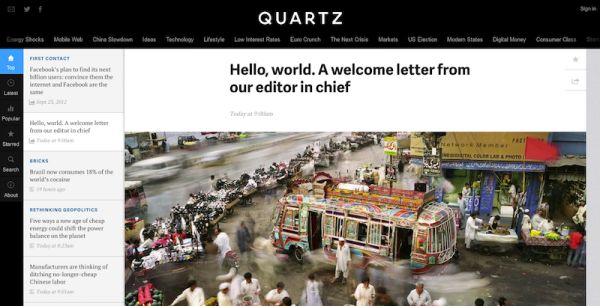Quartz: Journalism in the Digital Age

Today marks the launch of the Atlantic Media Co.'s news website, Quartz, or qz.com, a global business news outlet designed to provide the global community with intelligent journalism directly to their mobile phones. Unlike traditional news sources, Quartz is designed specifically for tablets and mobile phones, appealing to the fast-paced lifestyle of its audience.
In a letter posted today, Editor in Chief at Quartz Kevin J. Delaney welcomed readers to the site and explained the purpose of the news site.
Quartz is emerging in the wake of a financial crisis that exposed a fundamentally changed economic order with new leaders and ways of doing business. In today’s global economy, the most significant developments are found far from the traditional centers of gravity, and traditional ways of understanding the world no longer apply. Aware of this, we intend to do some things differently than you might expect.
Straying from traditional modes of journalism, Quartz is based on phenomena, not categories. Based on the idea that with the expansion of the Internet, readers are presented with endless sources of information, Quartz abandons the idea of "beats" and does not aim to provide comprehensive coverage in all aspects of the news. Appealing to a cosmopolitan audience, the news source will focus primarily on global news and how it relates to current events.
Screenshot of qz.com on the day of it's launch, from IVN.us
"When there are no pages and sections to constrain you, you are free to reframe your description of reality too," Gideon Lichfield, global news editor of Quartz explains.
Recognizing that, Quartz attempts to frame and report on issues not based on "beat" or category, but rather takes a holistic approach, encompassing all aspects of what Lichfield calls a "collection of phenomena."
So instead of fixed beats, we structure our newsroom around an ever-evolving collection of phenomena—the patterns, trends and seismic shifts that are shaping the world our readers live in. “Financial markets” is a beat, but “the financial crisis” is a phenomenon. “The environment” is a beat, but “climate change” is a phenomenon. “Energy” is a beat, but “the global surge of energy abundance” is a phenomenon. “China” is a beat, but “Chinese investment in Africa” is a phenomenon. We call these phenomena our “obsessions”. These are the kinds of topics Quartz will put in its navigation bar, and as the world changes, so will they.
For example, instead of the traditional all-encompassing drop-down menu for "Economy," Quartz distinguishes itself by including categories like Low Interest Rates, Markets, Digital Money, Consumer Class, and China Slowdown as points of focus.
To stay connected, Quartz has already launched a Twitter, Facebook,Tumblr, Google+, Sina Weibo, App.net, and Flipboard, the popular tablet app.
What do you think of this style of news reporting? Is it the journalism of the future?



